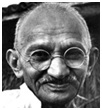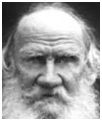|
 |
|
 |
|
|
||
John Ruskin - Creativity and Art
John Ruskin (1819-1900)
English artist, philosopher, writer and environmentalist (pictured right). Believed that the needs of nature and people must be respected. Lived from 1872 in Brantwood, beside Lake Coniston in the English Lake District. Who did he influence?
(Indian leader and philosopher, pictured right above)
(French writer, pictured right).
3. LeoTolstoy (Russian author, pictured right, of War and Peace)
(American architect, pictured right below) Why was he so creative?
1. Awareness and communication of beauty He opened his mind and imagination to: a) the beauty of nature b) new ideas “The greatest thing a human soul does in this world is to see something and tell what it saw in a plain way”, he said. He had great powers of observation and concentration, allowing him to paint things in the greatest possible detail. “Beauty is in the minutest detail of nature, and the simple things like a stream or wood”, he said.
2. Practicality Theories must have a practical purpose But he also said that the most beautiful things are the most useless like peacocks and lilies. 3. Lifelong learning His father, John James Ruskin (pictured right), was a wealthy wine importer and art lover, who
He was inspired by other great painters, particularly J.M.W. Turner (pictured right below). 4. Commitment to work Ruskin:
His “Law of Help” states that:
5. Philosophy Ruskin (pictured right in 1863) believed from his study of art and architecture that everyone can:
He hated the Industrial Revolution for exploiting people in factories. He said, “There is no wealth but life”. In other words, people should be:
6. Purpose He wanted to do things like art and writing that would last forever. “When we build, let us think that we build forever”, he said.
Key quotes on quality When love and skill work together expect a masterpiece. Quality is never an accident. It is always the result of intelligent effort.
Key quote on money and happiness There is no wealth but life.
Key quote on business success When we build, let us think that we build forever.
Key quote on corporate culture Obedience to a code of conduct based upon the teaching of the wise mind is the only foundation of success.
Key quote on design Life without industry is guilt, and industry without art is brutality.
Key quotes on motivation In order that people may be happy in their work, three things are needed: They must be fit for it; they must not do too much of it; and they must have a sense of success in it. The highest reward for a person’s toil is not what they get for it, but what they become by it.
Key quote on politics and government The first duty of government is to see that people have food, fuel and clothes. The second, that they have means of moral and intellectual education.
Key quote on society The strength and power of a country depends absolutely on the quantity of good men and women in it.
Key quote on education and training The first condition of education is being able to put someone to wholesome and meaningful work.
|
|
|
||
|
|
||
| Copyright © wisdomtowin.com 2025 All Rights Reserved | ||
|










